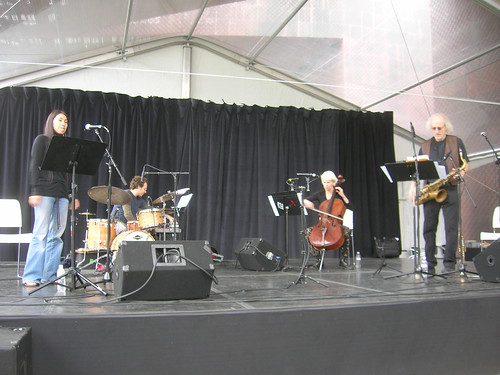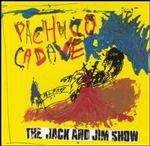Friday, November 7th, 2008
... 3:00 p.m. - 5:50 p.m. ...
KZSU, 90.1 FM
(Return to playlists.)
 It's been a couple of weeks now, but I recently had a free Sunday to make the trip
to San Francisco's De
Young Museum to see
Kihnoua,
the yet-unrecorded quartet led by Larry
Ochs of ROVA. The concept
seems to be a trio highlighting Dohee Lee on wordless vocals with
Scott Amendola on
drums -- plus a fourth components that varies. I've seen the band before
with Okkyung Lee on
cello, and this time it was Joan Jeanreneaud
in that place.
The music is largely improvised, with some kind of score used to create
a loose structure.
It's been a couple of weeks now, but I recently had a free Sunday to make the trip
to San Francisco's De
Young Museum to see
Kihnoua,
the yet-unrecorded quartet led by Larry
Ochs of ROVA. The concept
seems to be a trio highlighting Dohee Lee on wordless vocals with
Scott Amendola on
drums -- plus a fourth components that varies. I've seen the band before
with Okkyung Lee on
cello, and this time it was Joan Jeanreneaud
in that place.
The music is largely improvised, with some kind of score used to create
a loose structure.
During the past year, the De Young has been holding these outdoor
concerts on its cafe patio. This day happened to be wet and rainy, but
an enormous tent had been erected around the patio -- don't know if that's
always there or just up for the winter. The concerts are a fantastic
idea, being free (you don't even need to pay museum admission) with
fast, easy access to food and refreshments. The problem is that
the Academy of Sciences (or something with that kind of name)
has started up a Sunday rock-show series in the nearby bandshell.
Not only is it loud, but the parabolic ceiling to the bandshell means
the sound gets projected 'way downtown, so to speak.
That was bad news for Kinhoua, as the rock music leaked into the tent,
unstoppable (there's no proper door, to keep an outdoorsy feel).
Being largely improvised, Kinhoua's music relies on periods of silence
and a momentum of pacing that the musicians have to develop from
thin air and convey to one another -- basically, it sucks to have to play
it with someone blaring the radio next door. They forged on, though, and
the sound system turned out to be strong enough to wipe out most of
the rock band's noise. By the end of the first set, it was as if
the distraction wasn't even there -- but the band might have been
playing a little louder than usual to compensate.
The music worked. One piece featured tense waves of cello and vocals,
kind of a duet with Dohee Lee tossing out abstract near-spoken
declarations and fragments of improvised chanting, mixing African ideas
with Korean traditional forms (I'm stealing that description from Ochs'
promo material, so it's not just me who's hearing that).
That passage, in the middle of a
longer piece, got spotaneous applause from the audience -- folks were
listening. Similar chanting elements came up from the band as a whole
when the second set started; it's a very compelling element of this music.
I seem to remember Okkyung Lee going for a droney, hovering
presence during the last Kinhoua show I saw, but Jeanreneaud was more
deliberate, instigating the pieces with small classical-sounding
 fragments tossed about frequently. I found myself paying attention
to the cello for long spans.
fragments tossed about frequently. I found myself paying attention
to the cello for long spans.
The second set would have been a treat but wouldn't have left me
enough time to catch the
Maya
Lin exhibition (which includes that thing at right) and
a varied exhibition of Asian artists who'd worked in America.
The latter included lots of Japanese-Americans interred during WWII, and
I was glad to see some of their more abstract works -- folks like
Sabura Hasegawa, Ralph Iwamoto, Isamu Noguchi, and (on a less abstract note)
Mine Okubo, whose Citizen 13660 is now on my reading list.
On the crazier side of things, I got exposed to the dotty world of
Yayoi
Kusama and the painting "Beachcomber" by Alfonso Ossorio,
as seen here.
Format:
ARTIST -- "TRACK TITLE" -- ALBUM TITLE (LABEL, YEAR)
Horizontal lines denote microphone breaks.
* Peter Evans Quartet -- "Tag" -- Peter Evans Quartet (Firehouse 12, 2008)
 * Bill Cole's Untempered Ensemble -- "No One Knows the Paths in a Graden Better Than the Gardener; A Follower Should Always Allow His Guide to Lead" [excerpt] -- Proverbs for Sam (Boxholder, 2008)
* Bill Cole's Untempered Ensemble -- "No One Knows the Paths in a Graden Better Than the Gardener; A Follower Should Always Allow His Guide to Lead" [excerpt] -- Proverbs for Sam (Boxholder, 2008)
The latest from Cole's long-form septet, covering four tracks
clocking in at about 10 or 20 minutes apiece. The titles get long, too;
they're Nigerian proverbs.
As with the previous Untempered Ensemble album, Seasoning the Greens,
these pieces are grooving jams packed with free soloing, an open style
that's still loose, funky, and danceable, with exotic world-music touches
all over the place. Cole plays a variety of instruments I don't
immediately recognize, reeds from around the world. William Parker on
bass gets some gleeful solos in there. The whole thing is dedicated
to the late soul-jazz saxophonist
Sam Furnace, an original member of the band.
The E.R.A. -- "Into Pieces" -- Introducing the E.R.A. (Empty Room, 2008)
"E.R.A." seems to stand for "Empty Room Association" or something
similar. In any event, this is a nice DIY set of free/improv jazz from
some Brooklynites.
The Jimmy and Jack Show [Eugene Chadbourne and Jimmy Carl Black] -- "Buggy Boogie Woogie" -- Pachuco Cadaver (Fire Ant, 1995)

With the passing of Jimmy Carl Black at age 70 this past week,
I could have played any number of old Frank Zappa tunes, it's true.
But there's something special -- and particularly appropriate to college
radio -- about the sessions the old drummer did with guitar gonzo Eugene Chadbourne.
This album has the two of them covering Captain Beefheart tunes in
a loose, goofing-off manner. The music doesn't suffer for it; what you
get are some neat little dialogue exchanges, kind of like the
"Uh-huhs" and "You know it" snippets that blues bands kick around during
the solos. Not that Zappa can't be loads of fun, too, but maybe because
there are only two people here, Black's spirit seems to shine through
a lot more strongly.
This was no one-off project. The Jack and Jim show was on the road even
last year, as you can see in this September 2007
interview.
* Pulga -- "Still It Rides Me" [excerpt] -- Pulga Loves You (Fire Museum, 2007)
* Eri Yamamoto Trio -- "Bumpy Trail" -- Redwood (AUM Fidelity, 2008)
Carla Kihlstedt [2 Foot Yard] -- "Flash Flood" -- 2 Foot Yard (Tzadik, 2005)
* Yuganaut -- "Statement" -- This Musicship (ESP-Disk, 2008)
-- 4:00 p.m. --
 * Roberto Sierra -- "2x3: Armonias de Medioldia" -- Turner (New Albion, 2007)
* Roberto Sierra -- "2x3: Armonias de Medioldia" -- Turner (New Albion, 2007)
Classical sounding classical music, a variety of modern pieces. Only one,
"Cancieonero Sefardi," includes vocals, a soprano voice that rambles along
happily and ends in a choppy, shrieking attack that makes for a nice coda.
"2x3" caught my eye, title-wise, just because of the 2x4 installation by Maya
Lin that's mentioned up top. It's a
two-piano piece that interweaves the musicians in frequently non-matching
rhythms, drawing a rich sound out of the confusion. This track is the middle
movement of three; it starts out in a simple, safe, easy-classical motif and
quickly falls apart.
The "Trio" for strings and piano is an active, searching piece, with lots of
criss-crossing, wandering lines. Sierra's "Sonata" starts out strong, keeping
to a classical feel while giving the cello lots of chances for fast, hard
sawing -- driven stuff that leaves 'em on an "up" note.
* Turi Fuka -- "Drive My Car" -- Taze Hitoya (Slusaj Najglasnije!, 2007?)
Carla Kihlstedt -- "50 Miles" -- 2 Foot Yard (Tzadik, 2005)
* Tim Trevor-Briscoe and Nicola Guazzaloca -- "Searching the Gibbering Blues" -- One Hot Afternoon (Leo Records, 2007)
* Wayne Horvitz -- "Action 7: Spike Driver's Blues" -- Joe Hill: 16 Actions for Orchestra, Voices, and Soloist (New World, 2008)
* Neil Welch -- "Neptune" -- Narmada (Belle, 2007)
Georg Graewe Quartet -- "Multiversum" -- Melodie Und Rhythmus (Okka Disk, 1997)
I am a bad, bad person for failing to see any of Georg Graewe's
Bay Area appareances this week. Tonight's show, which also included a
set by a quartet with pianist Myra Melford,
would have been particularly cool, but I just didn't have the energy...
Georg Graewe, Marcio Mattos, Michael Vatcher -- "Trinkle Trinkle" -- Impressions of Monk (Nuscope, 1999)
Myra Melford/Be Bread -- "Fear Slips Behind" -- The Image of Your Body (Cryptogramophone, 2006)
* Carla Kihlstedt, Gino Robair, Matthew Sperry -- "Sonarchy One" [excerpt] -- Sonarchy 1998 (Majmua, 2008)
* Wondrous Horse -- "Il Tempo Ha Posata Sei Voci Che Gridano" -- Cavallo Meraviglioso (Fire Museum, 2008)
* Bernhard Gander -- "Ö" -- Bunny Games (Kairos, 2007)
AMM III -- "Radio Activity" [excerpt] -- It Had Been An Ordinary Enough Day In Pueblo, Colorado (ECM,1980)
A "new" AMM permutation that was really just the duo of
Keith Rowe
on prepared guitar and
Eddie Prevost
on drums. Rowe's guitar electronics are so out there, and Prevost's
drumming so subtle, that I didn't even notice Prevost's presence for the
first half of this 21-minute piece -- but he's in there, tinkering
behind Rowe's wall of laboratory sounds.
This piece is the longest on the album, and it's a fine improvisation
that at one point includes Rowe simply switching on a transistor
radio to some talk show or something. What's really surprising is
the passage near the end when Rowe starts playing some hammer-on chords
that are downright nice, line he's suddenly gone placid and
linear on us. I'm not sure I was happy with that, but it did
help the track jibe with "that" ECM sound.
* Kris Davis --
"Rye Eclipse" -- Rye Eclipse (Fresh Sound New Talent, 2008)
* = Item in KZSU rotation
! = Pop anomaly
? = Item not in KZSU library
-- Go back to Memory Select playlists.
-- Bay Area free/improv music calendar: http://www.bayimproviser.com.
 It's been a couple of weeks now, but I recently had a free Sunday to make the trip
to San Francisco's De
Young Museum to see
Kihnoua,
the yet-unrecorded quartet led by Larry
Ochs of ROVA. The concept
seems to be a trio highlighting Dohee Lee on wordless vocals with
Scott Amendola on
drums -- plus a fourth components that varies. I've seen the band before
with Okkyung Lee on
cello, and this time it was Joan Jeanreneaud
in that place.
The music is largely improvised, with some kind of score used to create
a loose structure.
It's been a couple of weeks now, but I recently had a free Sunday to make the trip
to San Francisco's De
Young Museum to see
Kihnoua,
the yet-unrecorded quartet led by Larry
Ochs of ROVA. The concept
seems to be a trio highlighting Dohee Lee on wordless vocals with
Scott Amendola on
drums -- plus a fourth components that varies. I've seen the band before
with Okkyung Lee on
cello, and this time it was Joan Jeanreneaud
in that place.
The music is largely improvised, with some kind of score used to create
a loose structure.



 * Roberto Sierra -- "2x3: Armonias de Medioldia" -- Turner (
* Roberto Sierra -- "2x3: Armonias de Medioldia" -- Turner (